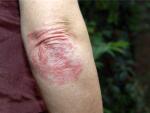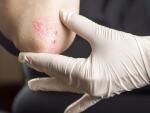
Psoriasis is a condition caused by a fault in the immune system that makes skin cells grow too fast and build up in patches. They can appear anywhere on your body, from your scalp to your toenails, and even on your genitals. Psoriasis flares in the genital area can cause itch, pain during sex, and a worsening of symptoms after sex. Genital psoriasis can also shake your confidence and cause you to avoid intimacy. It’s important to remember psoriasis is not a sexually transmitted disease. You did nothing to get it, and you can’t pass it along through touch. Getting the facts can help you receive the right treatment, take steps to help prevent symptoms, and get on with a healthy sex life.
What Genital Psoriasis in Men Looks Like
Whether you’re circumcised or uncircumcised, psoriasis in men appears on the penis shaft as several small red patches. The patches may look smooth, or they may look shiny and scaly. You may hear patches that look smooth referred to as “inverse psoriasis” to distinguish it from scaly plaque psoriasis. You may also see inverse psoriasis in areas near your genitals:
Pubis, the area above the genitals
The crease between the groin and thighs
The anus and skin around it
Treating Genital Psoriasis in Men
Genital psoriasis usually responds well to treatment, so it’s worth checking it out with your doctor. A non-prescription, fragrance-free skin moisturizer may be all that’s needed. Your doctor may also prescribe a topical solution that contains a low dose of corticosteroids for a relatively short period of time. Ultraviolet (UV) light may be an additional treatment option at a lower dose than would be used on less-sensitive parts of the body. Or, for severe cases, you may try an oral or injectable medication.
Genital Psoriasis and Intimacy
Having a psoriasis flare on your genitals doesn’t mean you can’t have sex, but the friction may make it uncomfortable. It’s also normal to experience difficulty having an erection due to tender, cracked skin. A few simple steps can help reduce irritation:
Use a lubricated condom
Cleanse your genital area after sex
Re-apply moisturizer or topical prescription medication according to your doctor’s instructions
Help your doctor help you by being open about your symptoms and how they’re affecting your sex life. The conversation may not be easy at first, but that’s the case with many health issues. Talking about it will get easier, and it’s essential for a proper diagnosis. Genital psoriasis can look similar to an infection or contact dermatitis (a rash that can be caused by an allergy), so the sooner you know what’s going on, the sooner you can start the right treatment.
Be open, honest, and upfront with your partner, too. Practicing what to say in advance can help. You may find opening up about how genital psoriasis affects you leads to more open communication in general and makes your relationship stronger. If you’re not currently in a relationship, don’t let your psoriasis stop you from dating. You don’t have to talk with someone new about your psoriasis until you feel the time is right. Relaxation techniques and counselling can help you deal with the stress and anxiety you may experience. Ask your doctor for information and resources.
Dealing with your genital psoriasis may feel daunting, but facing it head on will help you move forward. You may be surprised at how quickly psoriasis becomes less of a focus and just one of many everyday facts of your life.






























